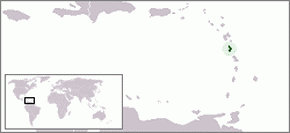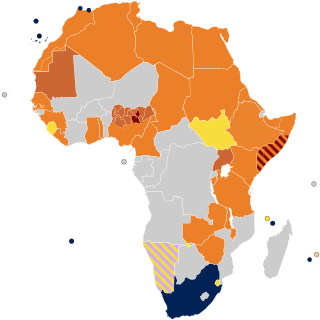
The Sexual Offences (Amendment) Act 2000 (c.44) is an Act of the Parliament of the United Kingdom. It set the age of consent for male homosexual sexual activities and for heterosexual anal sex at 16, which had long been the age of consent for all other types of sexual activities, such as vaginal sex or lesbian sex. As such, it made the age of consent for all types of sexual acts equal, without discrimimating on the basis of the type of act or of the sexes of those involved in the act. It also introduced the new offence of 'having sexual intercourse or engaging in any other sexual activity with a person under 18 if in a position of trust in relation to that person'.

Lesbian, gay, bisexual, and transgender (LGBTQ) people in Ghana face severe challenges not experienced by non-LGBT residents. Sexual acts between males have been illegal as "unnatural carnal knowledge" in Ghana since the colonial era. The majority of Ghana's population hold anti-LGBT sentiments. Physical and violent homophobic attacks against LGBT people occur, and are often encouraged by the media and religious and political leaders. At times, government officials, such as police, engage in such acts of violence. Young gay people are known to be disowned by their families and communities and evicted from their homes. Families often seek conversion therapy from religious groups when same-sex orientation or non-conforming gender identity is disclosed; such "therapy" is reported to be commonly administered in abusive and inhumane settings.

The rights of lesbian, gay, bisexual, and transgender (LGBTQ) people in the United Kingdom of Great Britain and Northern Ireland have developed significantly over time. Today, lesbian, gay and bisexual rights are considered to be advanced by international standards.

New Zealand lesbian, gay, bisexual, and transgender (LGBT) rights are some of the most extensive in the world. The protection of LGBT rights is advanced, relative to other countries in Oceania, and among the most liberal in the world, with the country being the first in the region to legalise same-sex marriage.

The Homosexual Law Reform Act 1986 is a New Zealand Act of Parliament that broadly legalised consensual sexual practices between men as well as consensual anal sex regardless of partners' gender. It removed the provisions of the Crimes Act 1961 that criminalised this behaviour. The legislation established a uniform age of consent, setting it at 16 for both same-sex and opposite-sex partners.

Lesbian, gay, bisexual, and transgender (LGBT) people in Dominica face legal challenges not experienced by non-LGBTQ residents. Homosexuality has been legal since 2024, when the High Court struck down the country's colonial-era sodomy law. Dominica provides no recognition to same-sex unions, whether in the form of marriage or civil unions, and no law prohibits discrimination on the basis of sexual orientation or gender identity.

Lesbian, gay, bisexual, and transgender (LGBT) people in Uganda face severe legal and social challenges not experienced by non-LGBTQ residents. Same-sex sexual activity is illegal for both men and women in Uganda. It was originally criminalised by British colonial laws introduced when Uganda became a British protectorate, and these laws have been retained since the country gained its independence.

The Criminal Justice (Scotland) Act 1980 is an act of Parliament in the United Kingdom. Most of the act's provisions were merely a consolidation of already existing legislation, and as such subject to little controversy, with the notable exception was section 80, which partially decriminalised private homosexual acts between consenting adults in Scotland.

Lesbian, gay, bisexual, and transgender (LGBT) rights in Africa are generally poor in comparison to the Americas, Western Europe and Oceania.

A sodomy law is a law that defines certain sexual acts as crimes. The precise sexual acts meant by the term sodomy are rarely spelled out in the law, but are typically understood and defined by many courts and jurisdictions to include any or all forms of sexual acts that are illegal, illicit, unlawful, unnatural and immoral. Sodomy typically includes anal sex, oral sex, manual sex, and bestiality. In practice, sodomy laws have rarely been enforced to target against sexual activities between individuals of the opposite sex, and have mostly been used to target against sexual activities between individuals of the same sex.

Lesbian, gay, bisexual, and transgender (LGBT) rights in Queensland have advanced significantly from the late 20th century onwards, in line with progress on LGBT rights in Australia nationally. 2019 polling on gay rights consistently showed that even in regional areas, Queensland is no more conservative about the subject than any other states.

Lesbian, gay, bisexual, and transgender (LGBT) people in the Australian state of New South Wales have most of the same rights and responsibilities as non-LGBT people.

The Anti-Homosexuality Act, 2014 was an act passed by the Parliament of Uganda on 20 December 2013, which prohibited sexual relations between persons of the same sex. The act was previously called the "Kill the Gays bill" in the western mainstream media due to death penalty clauses proposed in the original version, but the penalty was later amended to life imprisonment. The bill was signed into law by the President of Uganda Yoweri Museveni on 24 February 2014. On 1 August 2014, however, the Constitutional Court of Uganda ruled the act invalid on procedural grounds.

Lesbian, gay, bisexual, and transgender (LGBT) people in the Australian state of Tasmania have the same legal rights as non-LGBT people. Tasmania has a transformative history with respect to the rights of LGBT people. Initially dubbed "Bigots' Island" by international media due to intense social and political hostility to LGBT rights up until the late 1990s, the state has subsequently been recognised for LGBT law reforms that have been described by activists such as Rodney Croome as among the most extensive and noteworthy in the world. Tasmania's criminal penalties for homosexual activity were the harshest in the Western world when they were repealed in 1997. It was the last Australian jurisdiction to decriminalise homosexuality after a United Nations Human Rights Committee ruling, the passage of federal sexual privacy legislation and a High Court challenge to the state's anti-homosexuality laws. Following decriminalisation, social and political attitudes in the state rapidly shifted in favour of LGBT rights ahead of national trends with strong anti-LGBT discrimination laws passed in 1999, and the first state relationship registration scheme to include same-sex couples introduced in 2003. In 2019, Tasmania passed and implemented the world's most progressive gender-optional birth certificate laws. In July 2023, the Tasmanian government officially included and also added "asexual or asexuality".
Uganda has a very long and, quite permissive, and sometimes violent history regarding the LGBT community, stretching back from the pre-colonial period, through British colonial control, and even after independence.
John "Longjones" Abdallah Wambere is a Ugandan gay rights activist and co-founder of Spectrum Uganda Initiatives, a Kampala-based LGBTI rights advocacy organization with a focus on health education. Because of the threat of violence and persecution he faces in Uganda, Wambere was approved for asylum in the United States by the U.S. Citizen and Immigration Services on September 11, 2014. He currently resides in Cambridge, Massachusetts.

Capital punishment as a criminal punishment for homosexuality has been implemented by a number of countries in their history. It is a legal punishment in several countries and regions, all of which have sharia-based criminal laws, except for Uganda.

Monicah Amoding is a Ugandan politician, lawyer and social worker, who served as the district woman representative of Kumi District, in the 10th Ugandan Parliament, (2016–2021), as a member of the ruling National Resistance Movement political party.
This is a list of notable events in the history of LGBT rights taking place in the year 2023.

The Anti-Homosexuality Act, 2023 is an act of the Parliament of Uganda that restricts freedom of speech on LGBT topics and introduces harsher penalties for certain types of homosexual acts. On 21 March 2023, the bill was read a third time, and was then sent to President Yoweri Museveni for assent. On 21 April 2023, Museveni returned it to Parliament, which passed it again with minor amendments on 2 May. On 26 May, Museveni signed it into law.
















